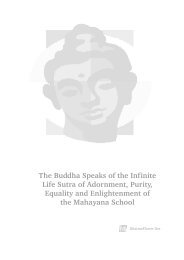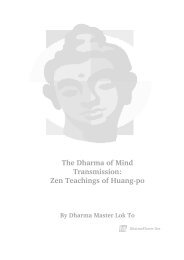Vipassana Meditation : Lectures On Insight Meditation by Venerable
Vipassana Meditation : Lectures On Insight Meditation by Venerable
Vipassana Meditation : Lectures On Insight Meditation by Venerable
Create successful ePaper yourself
Turn your PDF publications into a flip-book with our unique Google optimized e-Paper software.
Chapter SixNine Ways To Sharpen The Mental FacultiesThe Five Mental Faculties of a meditator are saddha, viriya, sati, samádhi, andpaññá: These five are known as Pancindriya (panca means five, indriya meansfaculties) as well as Pancabala (Five Mental Powers).1. Saddha means faith with right understanding or through rightunderstanding.2. Viriya means strenuous effort or energy.3. Sati means mindfulness or sustained, constant mindfulness.4. Samadhi means deep concentration.5. Paññá means wisdom, insight or enlightenment.For meditation, these Five Mental Faculties must be strong, powerful andbalanced as stated in the commentary on the Visuddhimagg a…Saddha mustbe firm and unwavering, and sati must be powerful and strong samádhi mustbe deep and paññá must be penetrating.Balancing the Mental FacultiesTo make these five faculties strong, powerful and balanced, there are nineguidelines, which a meditator must follow. If these faculties are strong butthey are not in balance, a meditator cannot attain insight and enlightenment ofthe cessation of suffering. Suddha (faith) must be in balance with paññá(wisdom), and samádhi (concentration) must be in balance with viriya(effort). The main mental factor - mindfulness, need not be in balance withany faculties; it must be constant, powerful, sustained and uninterrupted.If saddh is weak and paññá is powerful, a meditator may analyze hisexperience in the course of meditation. While experiencing a mental orphysical process, he will analyze it, especially if he has a wide knowledge ofthe Dhamma. When he analyses his experience, that analytical knowledgeimpedes his concentration. Then his concentration will be broken orweakened. There is no room for logical reasoning or philosophical thinking oranalyzing, which are not right understanding of the natural process of mentaland physical phenomena. When a Dhamma is not rightly penetrated,comprehended or realized, a meditator may have less faith or a disbelief in thedoctrine as a result of his analytical knowledge of the Dhamma or experience.<strong>On</strong>ly after he has completed the practice of meditation and experiencedenlightenment, can he analyze it in any way. Then he will have unwavering38









